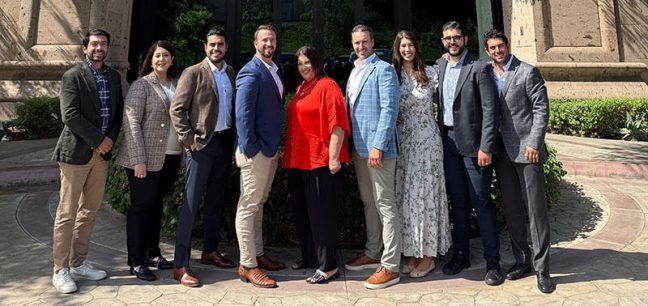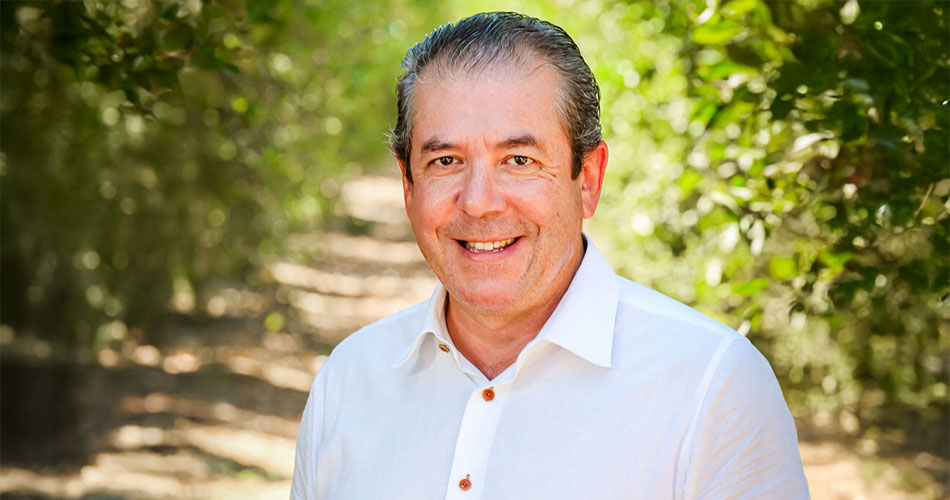Oscar González serves as COO and co-president of Northgate González Market. Brother Miguel had served alongside Oscar at the helm of the company until his recent retirement. Now brother Jesús has moved into the co-presidency slot with Oscar.
As other members of the second generation begin to retire, Oscar believes that one of the top imperatives is to make sure the emerging third-generation leaders – the G3s – continue to honor the legacy set down by the family’s patriarch and matriarch, Don Miguel González and Doña Teresa Reynoso González.
“In a family enterprise with such deep-rooted values and culture, honoring those and honoring the legacy really becomes foundational for any emerging leader,” Oscar said. “It’s a sign of respect. It’s a sign of feeling proud of the work that has been accomplished.”
Miguel González emigrated from Jalostotitlán, a town in Jalisco, Mexico, to the United States in 1966. His shoe shop, La Elegancia, had burned down in 1952, and he eventually realized that in order to support his large family, he needed to go north.
He and his oldest sons, Ramon and Francisco, moved to the U.S. in search of work and opportunity. Miguel came home to visit a couple of times each year. In 1976, Teresa and many of their kids moved to the U.S., too.
Though the extent of his retail experience was the shoe shop, Miguel decided that he’d like to start a business where he could employ his children. A grocery store fit the bill.
It would be a fortuitous move, as the opening of the first Northgate Market in 1980 coincided with a growing need for stores serving the needs of the growing number of Mexican immigrants.
“There was absolutely no strategy behind it,” Oscar said. “My father had been a merchant in Mexico for many, many years in the shoe business. In his mind, owning a business and being able to provide a job for his kids was really the primary reason, the impetus, of the first store. There was never the idea that we would build a large business.”
Miguel Sr. and Miguel Jr. mortgaged their home to open the first store in Anaheim in a converted liquor store. About half of the 13 siblings left their jobs and started working at the store.
“They put in sweat equity for a number of years, and that was the way the first store was born,” he said.
Oscar described his father as a very giving man, acting as a philanthropist before even knowing what the word meant.
“He was always trying to figure out how to help people; in particular, his employees. I guess the term now is ‘people first’ … I remember back in the day when he would make a full meal for lunch every day.
“My brother and sisters and the 10, 15 employees would all eat at the same table and rotate [turns eating]. More importantly, I remember the way he treated people and how people would reciprocate, whether that was children or employees early on.”
His mother also had a major impact on the family business, though she did not work directly at the stores.
“She was really sort of the driving force behind keeping the family united, keeping everybody on task and making sure that any frictions or issues that arose would be addressed,” he said. “She really played a key role in the unity of our family.
“Not that my dad didn’t, but my dad was, frankly, very old school. It was all about hard work, it was all about being honest. He didn’t say a whole lot, didn’t show a lot of emotion, but his example of hard work – being an honest man and his humility, always thinking about his family first – that was a big deal.”
Building on a strong foundation
The strong foundation set by Miguel and Teresa has been carried on through their 13 children, who continue to jointly own Northgate González Market. As the second generation is moving toward passing the torch to the third generation, they recognize the need to loosen the reins a bit and allow them room to grow.
“I think it’s very important that emerging leaders are given the opportunity to innovate, to really be able to dream on their own and to be able to make mistakes,” Oscar said.
Trying new things sometimes leads to mistakes, but the company culture is to learn from them. And when new ideas do work, the culture is to capitalize on them and keep building.
There are G3s today who attend the company’s board meetings, which Oscar believes is an important time for them.
“Providing a governance structure for future family leadership on the board of directors is a must, because I think it really allows two things to happen,” he said. “It allows for current family board members to be able to cede their spot, to a certain degree, and then secondly, it also gives that future generation a great sort of foundation and a structure to be able to have the difficult conversations and make the appropriate decisions.
“Frankly, that’s been one of the most important accomplishments for my brothers and sisters, and certainly to this next generation, and hopefully for generations to come.”

The presence of the G3s already is being felt, he added.
“In many regards, the go-forward market strategy that we have embarked on has been a combination of the two generations of leadership within the organization,” he said.
But there is still work to be done. He said he and the other second-gen owners need to be intentional to create an environment where the third generation can “ideate and implement and adjust,” while the G3s need to be “curious and hungry and confident to be able to really make meaningful transformation.”
Northgate also has been intentional to bring in talent from outside the family.
“That’s the magic,” Oscar said of the Northgate team’s blend of family and non-family members.
“Nepotism will never work, and it’s important that the sort of ‘homegrown’ talent is always included, and it’s always balanced with the family leadership,” he said.
“That’s really the culture that we’ve created, where ideas and where decisions are encouraged. And they’re not exclusive to family. It really is sort of a labor of love here.”
Education’s importance emerges
Oscar said that when his dad came to the United States, there were three things he was focused on – putting a roof over their heads, making sure they had necessities like food and clothes and teaching his children to work hard. Higher education was somewhere further down the list of priorities.
“In that generation, formal education beyond high school was a luxury,” he said, adding several of his older siblings – Oscar is the youngest of the 13 second-generation siblings – helped contribute financially to the family rather than embarking on educational pursuits.
“Education, as I have grown up, has been so important,” he said. “Not many of my siblings have had an opportunity like I had. My brothers were working, helping support the family.”
Under Oscar’s leadership and with the blessing of the second generation of Northgate owners, “investing in education in both our family leadership as well as our non-family leadership has become a strong part of who we are in our culture,” he said.
Northgate has had multiple graduates of the Food Industry Management (FIM) program at USC’s Marshall School of Business. Utilizing a Western Association of Food Chains (WAFC) program, Northgate’s EVP of Marketing and Merchandising Mike Hendry has “been super passionate” about an English as a Second Language training course.
Northgate also is involved in Pepperdine University’s MBA program and is connected to many community colleges in Southern California through the scholarships it presents each year. The funds for the scholarships primarily are generated by the annual golf tournament sponsored by its Familia González Reynoso Foundation.
The scholarships are “part of what we do to give back,” Oscar said. “Education has become a strong fabric within our organization, and we realize that our associate base is aspirational. Many times, I think – particularly in our industry – you have a lot of young, hard-working people with a great work ethic, hungry and they need the support on the education front.
“And it’s not just the financial support but also the mentorship support.”
Oscar is personally involved with Cristo Rey, a new nonprofit high school in Orange County. The school’s website describes it as “a Catholic learning community that educates young people of limited economic means to become men and women of faith, purpose and service. Through a rigorous college preparatory curriculum, integrated with a relevant work study experience, students graduate ready to succeed in college and in life.”
Added Oscar, “It’s about giving kids that otherwise wouldn’t have had an opportunity to have a high-quality education and also a work-study program that is a part of the Cristo Rey model that allows us to hire some of the kids from the school.”

